President Gabriel Narutowicz was walking around the building of the Society for the Encouragement of Fine Arts when three fatal shots were fired. How was the first Polish president murdered?
Poland, reborn as a result of World War I, was generally regarded as a "temporary creature", or, as the Germans and Czechs claimed, a "seasonal state", in order not to resort to the later statement of the USSR Minister of Foreign Affairs, W. Versailles ".
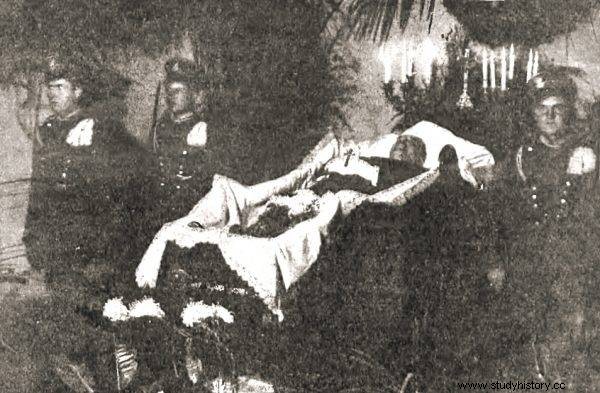
Honor guard at the coffin of the murdered Gabriel Narutowicz.
Despite these unfavorable circumstances, the enthusiasm that accompanied the creation of state structures brought positive results. The state defended itself against foreign intervention, fought for itself borders, and also created the foundations of the system.
First picks
Work on the Constitution began as early as 1919. The key to this problem was the role of the president and his powers. The first concept was modeled on the United States, where the president is the head of the government and has great powers. The second concept, called the people's project, assumed the existence of a unicameral Sejm and the president and government were the executive powers. The third project, modeled on the French one, assumed the existence of a bicameral parliament electing the president, but the actual power would lie with the government.
The constitution, finally passed in March 1921, limited the president's powers to representative functions. Its creators feared that Józef Piłsudski would become president and did not want to hand over too much power to him.
In November 1922, parliamentary elections were held. 68% of citizens took part in them. They were won by the right-wing block gaining 29% of the votes. The block of national minorities came second with 16%. The parliament lacked a clear majority capable of forming a stable government and, most importantly, electing the president of the Republic of Poland . The National Assembly to make this election was convened on December 9. Five candidates were nominated, including the candidate of the National Democracy of Count Maurycy Zamoyski, Stanisław Wojciechowski, Gabriel Narutowicz and Ignacy Daszyński. National minorities have nominated Jan Baudouin de Courtenay.
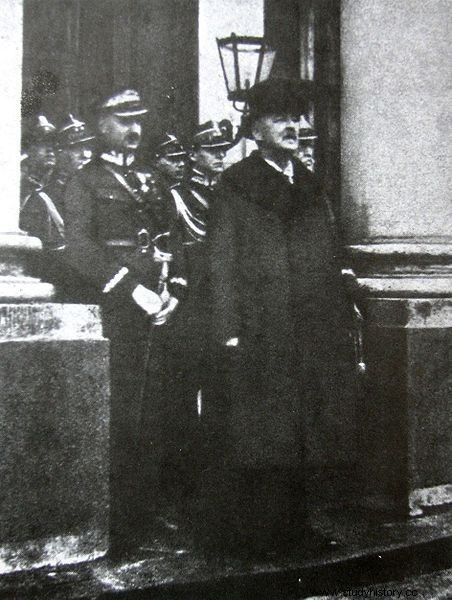
Gabriel Narutowicz after taking the oath of President
In the first round of voting, Zamoyski won the most votes, but he did not get the majority required by law. In the following rounds more candidates dropped out, and finally Zamoyski and Narutowicz reached the decisive vote. Narutowicz won it with 289 votes. So Poland had a president. The information about the election was communicated through Prime Minister Nowak. As he mentioned, in a diary published years later:
Narutowicz was standing behind the desk in his office ... and I was facing him, with the Marshal of the Sejm Rataj on his right and the Marshal of the Senate Trąbczyński on the left. I have never seen such terror in a human face as it was reflected on Narutowicz's face at that moment when he heard my account and when he replied that he was bowing to the will of the National Assembly and accepting the election ... It seemed that Narutowicz saw beyond the delegation our ... death skull grinning at him.
The choice, however, did not end the dispute. The right wing came out against this candidate during the next votes. First, efforts were made to force him to resign from his candidacy. As Narutowicz rejected the proposal, members of the National Democracy tried to interrupt the deliberations of the National Assembly. When this failed too, they blackmailed members of national minorities, especially Jews, to vote for a right-wing candidate or not to vote. After the election of President Narutowicz, calls were made to resign.
The right-wing parties even published a proclamation in which it was emphasized that they could not take responsibility for the course of state affairs in such a state of deeply unhealthy state of affairs and would refuse any support to governments appointed by the President, imposed by foreign nationalities:Jews, Germans and Ukrainians. They declared that they would take up the fight for the national character of the Polish state, threatened by this choice. The slanderous campaign against Narutowicz was carried out by the entire right-wing press.
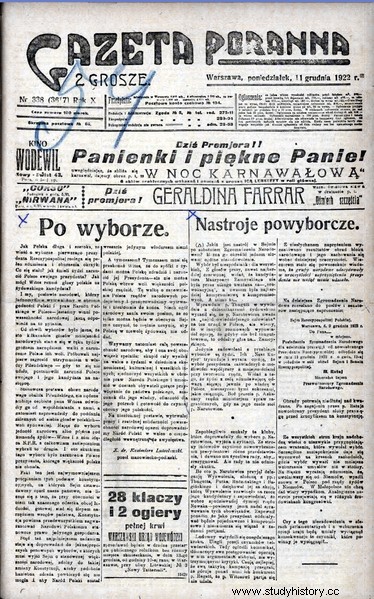
Gazeta Poranna 2 Grosze "from December 11, 1922 - title page with a text by Kazimierz Lutosławski announcing a national treason after Gabriel Narutowicz was elected President of the Republic of Poland
As the president persisted, it was decided not to allow him to take the oath. Despite these actions, the swearing-in took place, although on the way to the building of the Seym he encountered many unpleasantries. Opponents organized demonstrations, Narutowicz, riding in the carriage, was insulted and thrown with snow and mud . The responsible government failed to provide adequate protection. The president-elect was not accompanied by the prime minister of the government during his trip, although he later appeared in the Sejm building. There are barricades in the streets.
Despite these difficulties, on December 11, 1922, during a session of the National Assembly, Gabriel Narutowicz was sworn in as the president of the Republic of Poland. The National Assembly was opened at 12.15. Marshal Rataj asked Narutowicz if he accepted the choice. When he replied that he accepted, the vow was taken.
Therefore, the President swore to Almighty God and swore to the Polish Nation to respect and defend the rights and, above all, the constitutional law, to serve the good of the Nation faithfully, to protect the dignity of the Polish name and to be guided by justice. He ended his oath with the words, "So help me God."
Who was the first president of the Second Polish Republic?
Gabriel Narutowicz was born in 1865 in Żmudź to a noble family with insurgent traditions. During his studies, he went to Switzerland, where he graduated from the Polytechnic University in Zurich. While in exile, he joined the socialists, and then Józef Piłsudski . He specialized in the construction of hydropower plants and soon became a world-class specialist in this field. He also took the chair at the Polytechnic in Zurich. After the end of the war, he returned to Poland, engaging in work on the regulation of the Vistula River. In successive governments he held important positions, was the minister of public works, chaired the State Reconstruction Council . He was a politician recognized in Europe. In mid-1922, he became Minister of Foreign Affairs.
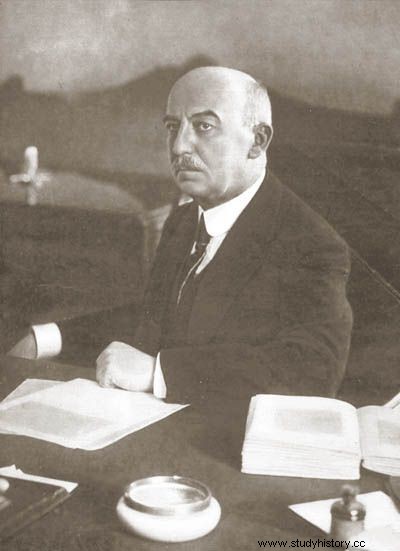
Gabriel Narutowicz resigned from his lucrative post in exile to return to Poland
In general, comments on his election did not question his qualification. It was believed that the experience of the functioning of democracy in Switzerland, where he had spent a large part of his life, would allow him to pursue a policy of consent, respecting the basic principles of democracy. As Marek Andrzejewski writes, the election of a professor of the renowned technical university in Zurich for the president - taking into account his competences, intellectual level, broad horizons, inexhaustible energy and the course of his political career so far was an appropriate move . Narutowicz was a righteous man, an authentic patriot, a person ready to make sacrifices, devoted to Poland, far from fanaticism, pragmatic.
Some articles reminded that, at the call of the national defense government during the Polish-Bolshevik war, he abandoned his post at the University of Technology in Zurich to serve his homeland. This opinion was shared by people who thought rationally and wanted the good of the country. Socialists, albeit without enthusiasm, positively received the election, although they added that after Piłsudski all other candidacies looked pale . It was added, however, that the head of the state was an honest democrat, a cultural politician and an impeccable activist.
Narutowicz was attacked by the gentry and, of course, by the national camp. Gazeta Warszawska published an article covering the course of the events:
On the news that Narutowicz, a Belweder supporter, who obtained the majority of votes from Jews, Germans and other national minorities, was to become President - one spontaneous cry broke from the young people's breasts:We do not want such a President! We don't know him! Against the Jews! This cry flew through the streets of Warsaw and a great march was launched spontaneously. General Haller spoke to the gathered people, stating that Poland had been battered, so we had to fight for victory by supporting our own people. Father K. Lutosławski asked in the article:What happened? How dare the Jews impose their President on Poland? How could Witos cast Polish votes on a Jewish candidate?
In Dziennik Poznański, which was published in Wielkopolska, the peasantry was accused of national treason.
Many people who were sympathetic to him were not at all pleased with this choice. Marshal Piłsudski expressed his doubts . After the election, during the conversation, the marshal commented on the behavior of the street with the statement "these people felt better under the one who trampled their necks and hit them in the face" . Referring to the information about frequent threatening calls directed to the President, the marshal stated that when he was the head of state, "lice came out from everywhere."
Fiery public speeches of the representatives of the right at rallies and extremely emotional press articles reached the convictions part of Polish society.
Assassination of the President
The state authorities behaved inexplicably, especially the minister of the interior, who saw no problem in the mass street demonstrations organized by Narutowicz's opponents. He also did not find it necessary to react and calm the situation .
After the election, the President thought about creating a government that could be the basis for building a national consensus. So he intended to propose high and important positions even to his political opponents. His competitor, M. Zamoyski, was to become the Minister of Foreign Affairs, and Endek Władysław Grabski - the Minister of the Treasury. However, the President was not able to implement this idea. On Saturday, December 16, 1922, he began his office by pardoning a Ukrainian sentenced to death. Then he met with former Prime Minister Leopold Skulski, with whom he made an appointment for Sunday hunting.
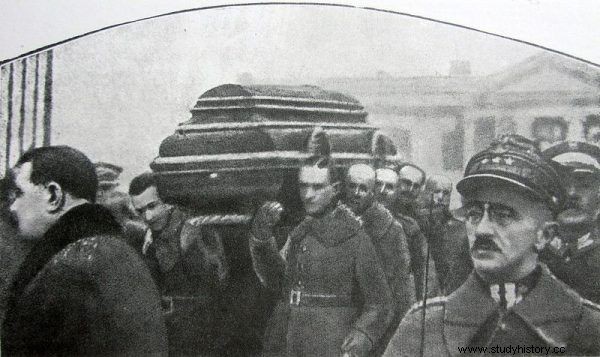
Taking the coffin with the body of President Gabriel Narutowicz out of Belweder Palace, December 19, 1922
He had a feeling about his impending death, because he asked Skulski to look after his children in case of misfortune . Then he went to the opening of the exhibition in Zachęta. After greeting the president and cutting the ribbon, the meeting proceeded to the first room. Narutowicz was shot there too . He died in the hands of the poet Kazimiera Iłłakowiczówna. His killer was a painter associated with the right. He did not run away after the attack, although it would have been possible in the prevailing chaos. Earlier, he also planned an attack on Piłsudski.
The assassination of President Narutowicz made a great impression on part of the society. As Maria Dąbrowska noted "there was a hideous, gloomy catastrophe ... I remember my stupor, as if suddenly in the heart of my nation I saw a dark cavern of the deadly basilisk" .
The killer was sentenced to death. However, he was not a murderer for everyone and some considered him a national hero. For his soul, some right-wing priests offered masses ...
